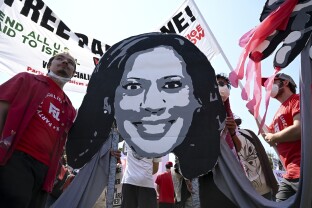When Democratic voters began protesting President Joe Biden’s stance on the war in Gaza by voting “uncommitted” in primaries earlier this year, Imran Salha — an imam at the Islamic Center of Detroit — enthusiastically endorsed the campaign.
“President Joe Biden, history will record that we decided to be uncommitted to you because humanity, righteous Jews, Muslims and Christians decided to commit to each other,” he said at a rally just days before Michigan’s Democratic primary, flanked by leaders in the Uncommitted National Movement.
Now, just over two months out from the presidential election, Salha wants nothing to do with Uncommitted National — but not because he’s any fan of Kamala Harris.
